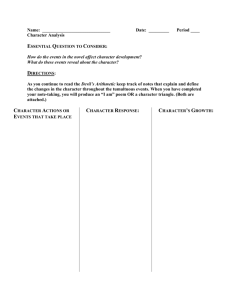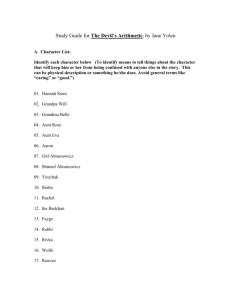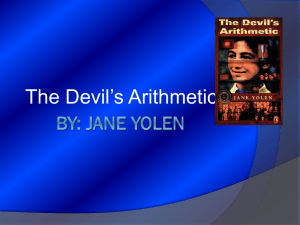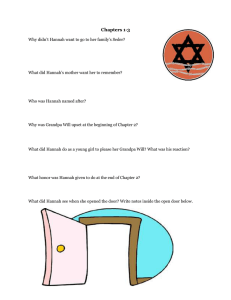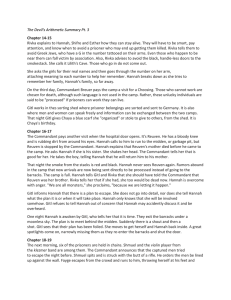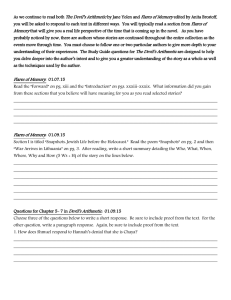Direct Quote
advertisement
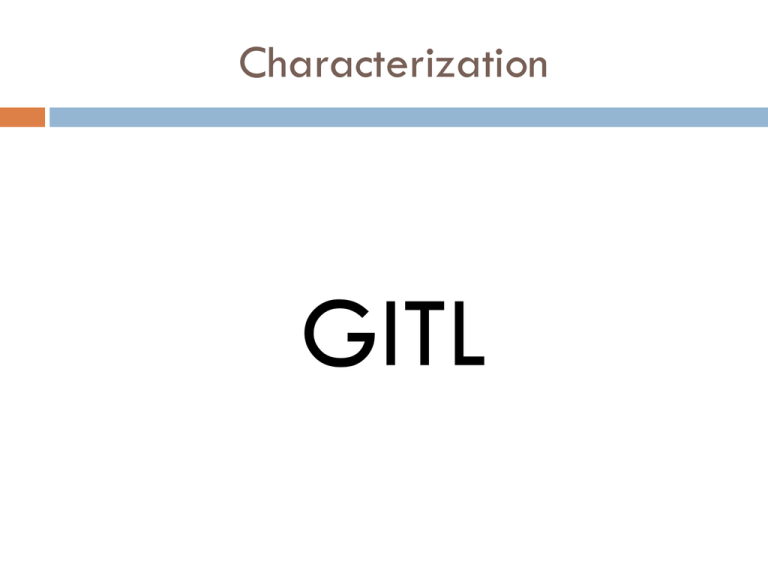
Characterization GITL Context: In Chapter 4, Hannah finds herself in a different place, and she sees Gitl for the first time. Direct Quote: The narrator explains, “The woman was dressed in a dark skirt with a smudged apron…sleeves rolled up, and blue kerchief on her head. Her bare arms were dusted with flour…she was pounding bread dough” (Yolen 23). Commentary: This description makes me think Gitl is a common woman. She does not sound rich or fancy. Instead, Yolen characterizes her as someone who works hard around her house. Context: As Gitl continues to prepare food she instructs Hannah to set the table with the Sabbath cloth because the next day’s wedding is a special occasion. Direct Quote: Gitl says to Hannah, “’Well, Chaya, move!’” (24). When Hannah remains standing, Gitl asks, “’Why are you standing there looking like a Chelm fool, Chaya? The cloth child. I swear, the fever that carried your poor parents off…has done more damage than we thought’” (24). Commentary: Gitl expects her orders to be followed. She seems to have a strict kind of tone to her when she speaks. Context: When Shmuel enters the house from the field, he hugs Hannah. Gitl scolds him. Direct Quote: She says, “’Put her down, Shmuel!...You are so much of a prize you can kiss women without bathing?’” (25). Commentary: Gitl has no problem ordering her brother around. She seems to be the one in charge in the house. Context: Twice in Chapter 4, Shmuel mentions men that Gitl could be matched with as a wife. Yet in both cases, Gitl quickly denies interest. First Shmuel suggests she could marry Yitzchak the butcher. Indirect Quote: Gitl calls him a monster and suggests he only wants someone to watch his children for him (27). Later when Shmuel suggests Gitl wants to hear from Avrom Morowitz so she can move to America, Gitl snaps back that she would not move to America. She plans to live in the Shetl forever just as her parents did. Commentary: Gitl clearly does not depend on a man for her happiness or safety. She is traditional in that she plans to stay in her home village as her parents did. She is an independent woman, and the way she responds to Shmuel’s comments make her seem a bit feisty. Context: At the end of Chapter 4, Hannah seems to be in shock about her situation. She gets into bed and has little to say. Gitl comforts her. Direct Quote: Gitl calls Hannah a “poor little bird,” and she tells Hannah, “’Never mind, little Chaya…Shmuel and I—we are your family now’” (30-31). Commentary: Even though Gitl has a hard edge to her, she also is loving. Earlier in the chapter she refers to Shmuel’s fiancé as a “jewel,” and here she handles Hannah softly, trying to help her feel comfortable. Context: When Yitzchak arrives in Chapter 5, Shmuel explains the sleeping arrangements for the wedding night. She and Hannah will not sleep in the same small house as Shmuel and Fayge. Gitl yells at Shmuel not to speak of these things in front of a child. Yitzchak tells Gitl Shmuel meant no harm, and Gitl lashes out at him. Direct Quote: She snaps, “’Hush, Yitzchak the butcher. Do not tell me in my house what is and what it not’” (38). Commentary: Here Gitl reveals her tough side. She will not tolerate someone speaking against her in her home, and she has no problem sternly correcting someone, man or woman, who breaks her rules. Context: As this exchange in Chapter 5 ends, Gitl discovers Yitzchak left his children outside the house when he first came in. They come in and then are taken back outside by Yitzchak as they help prepare for the wedding. Direct Quote: Gitl says, “’Imagine leaving those sweet, motherless children outside like chickens in cages’” (40). Commentary: Again, we see Gitl has a soft side to her. Just like she spoke softly to Hannah in the previous chapter, she speaks gently about Yitzchak’s two children, Reuven and Tzipporah.
